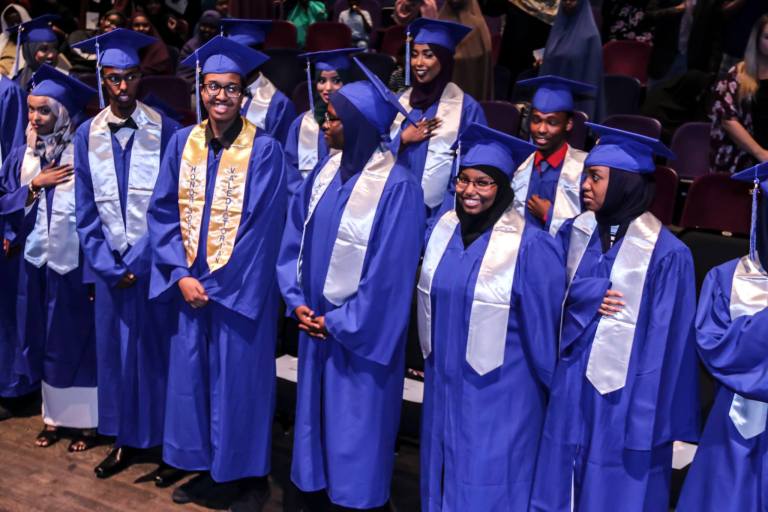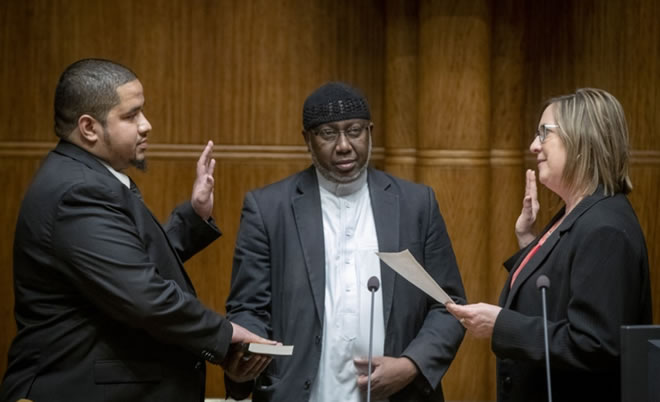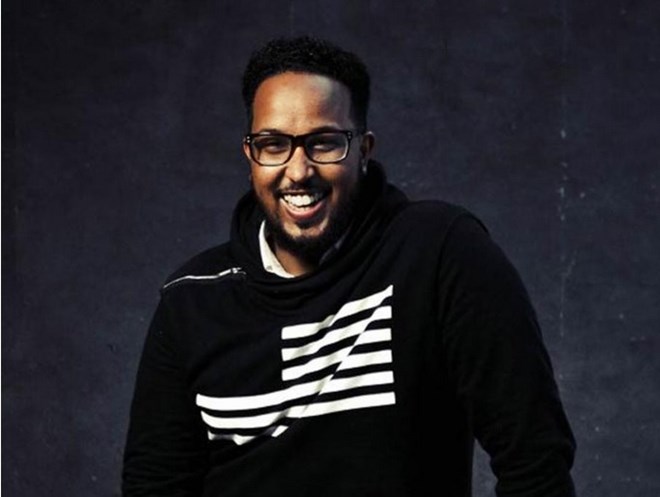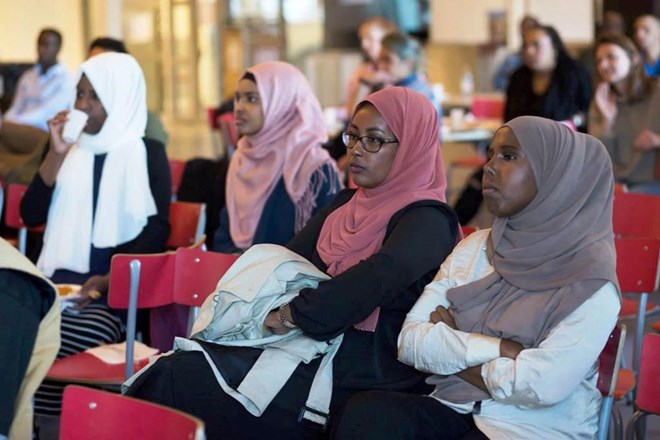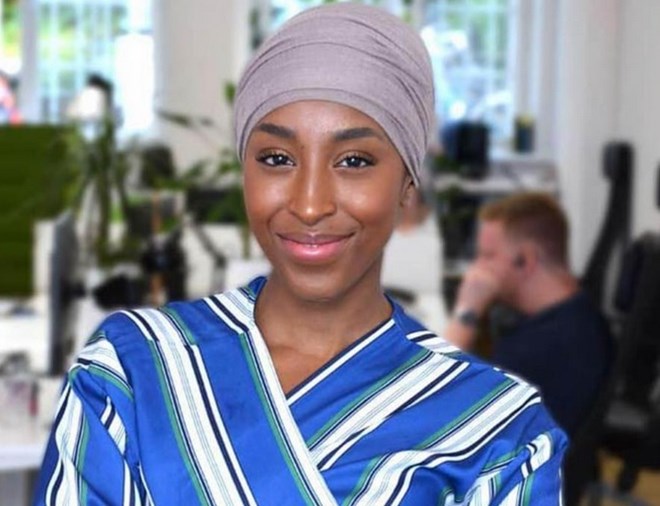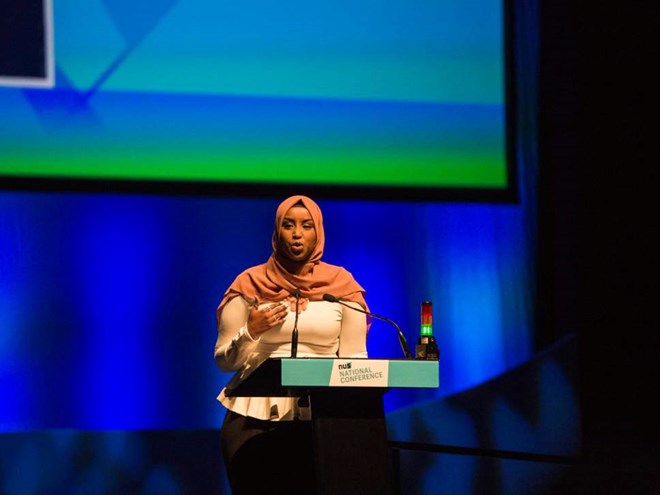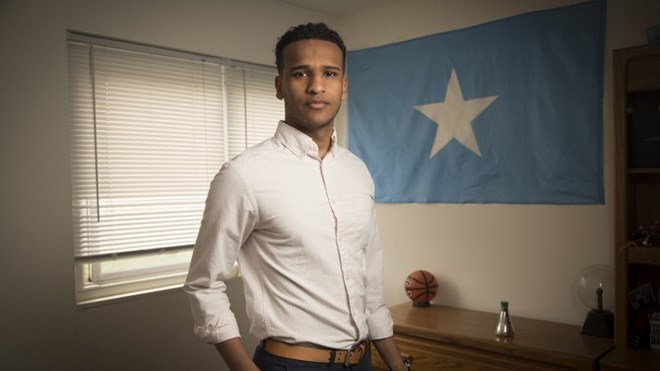Refugee Turned CEO: How This Entrepreneur Found A Sweet Spot For Creativity In War-Torn Somalia.
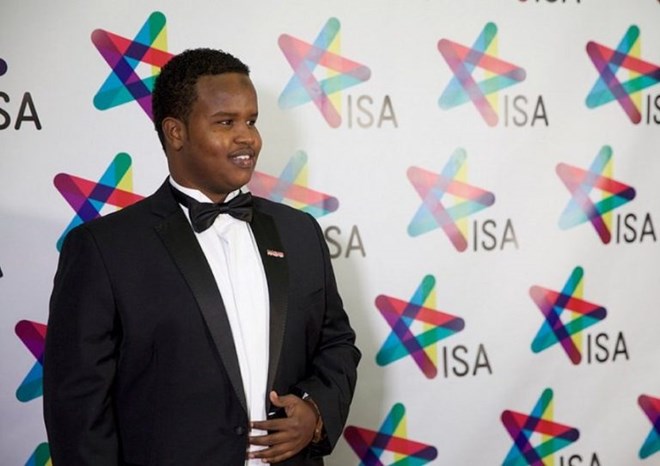
Some twenty-nine years ago, Mohamed Bashir Oman, was born in Somalia’s troubled capital, Mogadishu. At a time when the first shells of artillery had just begun to drop and the walls were just getting ridden with the first spray of bullets, Somalis could be seen fleeing the flashpoints of the war that had just broken out in search of safe zones.
Mohamed Bashir Oman, better known as ‘Maxamed Midnimo,’ was only a child when the attacks became an everyday affair and like most other families, his family had moved from place to place in search of peace and quiet, however temporary.
Life became sort of nomadic for them as they were often migrating – and this was largely because a ‘safe zone’ was only so for as long as it was. The warring factions were drawing precariously close and running seemed like a temporary fix at best, unless it meant fleeing the country entirely.
Midnimo and his family did get some much-needed and long-sought respite when the opportunity to flee Somalia for the Netherlands as refugees presented itself. His family seized the opportunity, relocated to Europe, and set out to start life anew with the trauma of the ongoing war behind them. Midnimo, thus, spent much of childhood and teenage years as a refugee in a foreign land.
But he wasn’t going to allow refugee status stop him from fulfilling his dreams. Full of ambition from such a young age, he was determined to make the most of the situation. Thus, he had a normal childhood, stayed in school, and went on to study Graphic Design.
He also went on to work as a Community Educator and this is where his stock began to rise. Such was his obvious dedication to the growth of the Somali Community in the Netherlands that he rose through the ranks.
Having started out as an educator, his doggedness saw him become a board member of the Somali Community Organization in Nijmegen, Netherlands, and subsequently, its Chairman.
"On a summer vacation to Africa in which he visited his home country along with two other African countries; Ethiopia and Djibouti, Midnimo was exposed to several promising business opportunities."
Some of these ideas had connections with his field – advertising/design. Upon his return to the Netherlands, he was probably bursting at the seams with ideas.
Somalia did begin to recover from the ravages of the long-standing chaos when some semblance of peace began to surface in 2012. Scores of citizens who had fled the country at the peak of the violence were making a comeback to their homeland. Some had even moved on from counting their losses and were now setting up businesses of their own in Somalia.
And before long, Midnimo hopped on the bandwagon. Since the vacation, he had given a lot of thought to going back home to work on the opportunities he had identified on his earlier trip and it augured well that the country was now coming out of many years of turmoil.
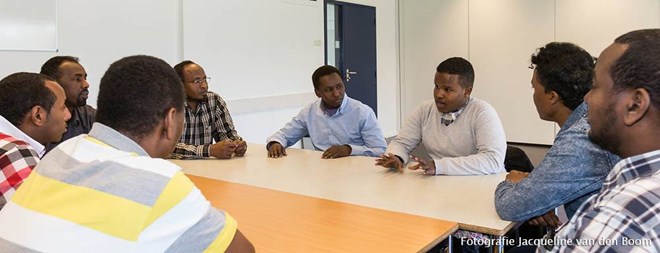
Sure, the Somali entrepreneur had made up his mind to venture into business in his country of birth, but he wasn’t about to just dive in head first. He wanted it to be a calculated entry. So, he spent most of 2013 conducting market research, learning the ropes, and getting to grips with vital numbers from the Somali market.
That groundwork, together with some support from members of his family, eventually led to the establishment of Daauus Creative Design Agency in 2015.
From the ground-up, Midnimo has built a budding company in Somalia which currently employs no less than 13 people amongst whom are designers, photographers, marketers, sales representatives, and a host of others.
As Midnimo says; “My dream was to start something that makes not only me happy, but my beloved ones as well. I may have come with the business idea, but no one can be successful without the help of passionate people who strive to help them realize their goals. Although it took some time to find ambitious minds, I’m glad that I now have a team that believes in the business philosophy.”
"Two years after the company kicked off operations, it took home Goobjoog Business Radio’s Marketer of the Year Award in Somalia."
The following year, Daauus was named Business of the Year at the International Somali Awards in London. And it sure looks like there is more in the offing.
Despite the war-induced travails of his early life, the Somali entrepreneur does deserve some credit for choosing to return to his home country with a mindset formed around contributing to the rebuilding process.
Although parts of the country are still prone to intermittent unrest, Midnimo is committed to making things better – quite the inspiration for Diasporans who are nursing thoughts of returning to the motherland and effecting change.
https://www.hiiraan.com/news4/2019/..._spot_for_creativity_in_war_torn_somalia.aspx

Some twenty-nine years ago, Mohamed Bashir Oman, was born in Somalia’s troubled capital, Mogadishu. At a time when the first shells of artillery had just begun to drop and the walls were just getting ridden with the first spray of bullets, Somalis could be seen fleeing the flashpoints of the war that had just broken out in search of safe zones.
Mohamed Bashir Oman, better known as ‘Maxamed Midnimo,’ was only a child when the attacks became an everyday affair and like most other families, his family had moved from place to place in search of peace and quiet, however temporary.
Life became sort of nomadic for them as they were often migrating – and this was largely because a ‘safe zone’ was only so for as long as it was. The warring factions were drawing precariously close and running seemed like a temporary fix at best, unless it meant fleeing the country entirely.
Midnimo and his family did get some much-needed and long-sought respite when the opportunity to flee Somalia for the Netherlands as refugees presented itself. His family seized the opportunity, relocated to Europe, and set out to start life anew with the trauma of the ongoing war behind them. Midnimo, thus, spent much of childhood and teenage years as a refugee in a foreign land.
But he wasn’t going to allow refugee status stop him from fulfilling his dreams. Full of ambition from such a young age, he was determined to make the most of the situation. Thus, he had a normal childhood, stayed in school, and went on to study Graphic Design.
He also went on to work as a Community Educator and this is where his stock began to rise. Such was his obvious dedication to the growth of the Somali Community in the Netherlands that he rose through the ranks.
Having started out as an educator, his doggedness saw him become a board member of the Somali Community Organization in Nijmegen, Netherlands, and subsequently, its Chairman.
"On a summer vacation to Africa in which he visited his home country along with two other African countries; Ethiopia and Djibouti, Midnimo was exposed to several promising business opportunities."
Some of these ideas had connections with his field – advertising/design. Upon his return to the Netherlands, he was probably bursting at the seams with ideas.
Somalia did begin to recover from the ravages of the long-standing chaos when some semblance of peace began to surface in 2012. Scores of citizens who had fled the country at the peak of the violence were making a comeback to their homeland. Some had even moved on from counting their losses and were now setting up businesses of their own in Somalia.
And before long, Midnimo hopped on the bandwagon. Since the vacation, he had given a lot of thought to going back home to work on the opportunities he had identified on his earlier trip and it augured well that the country was now coming out of many years of turmoil.

Sure, the Somali entrepreneur had made up his mind to venture into business in his country of birth, but he wasn’t about to just dive in head first. He wanted it to be a calculated entry. So, he spent most of 2013 conducting market research, learning the ropes, and getting to grips with vital numbers from the Somali market.
That groundwork, together with some support from members of his family, eventually led to the establishment of Daauus Creative Design Agency in 2015.
From the ground-up, Midnimo has built a budding company in Somalia which currently employs no less than 13 people amongst whom are designers, photographers, marketers, sales representatives, and a host of others.
As Midnimo says; “My dream was to start something that makes not only me happy, but my beloved ones as well. I may have come with the business idea, but no one can be successful without the help of passionate people who strive to help them realize their goals. Although it took some time to find ambitious minds, I’m glad that I now have a team that believes in the business philosophy.”
"Two years after the company kicked off operations, it took home Goobjoog Business Radio’s Marketer of the Year Award in Somalia."
The following year, Daauus was named Business of the Year at the International Somali Awards in London. And it sure looks like there is more in the offing.
Despite the war-induced travails of his early life, the Somali entrepreneur does deserve some credit for choosing to return to his home country with a mindset formed around contributing to the rebuilding process.
Although parts of the country are still prone to intermittent unrest, Midnimo is committed to making things better – quite the inspiration for Diasporans who are nursing thoughts of returning to the motherland and effecting change.
https://www.hiiraan.com/news4/2019/..._spot_for_creativity_in_war_torn_somalia.aspx

